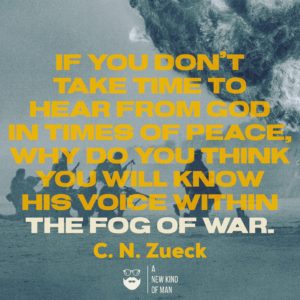
ORIGINS
The fog of war is a common phrase among today's military addressing the inability to discern friend or foe on the battlefield. This phenomenon can paralyze troops leading them to peril, so there have been many different training scenarios that have better equipped soldiers to communicate and control their emotions to defeat the enemy.
The more you sweat in peace, the less you bleed in war.
Norman Schwarzkopf
The word "fog" in reference to uncertainty in war was introduced by the Prussian military analyst Carl von Clausewitz in his posthumously published book, Vom Kriege (1832), which appeared in English translation in 1873 under the title On War:
War is the realm of uncertainty; three quarters of the factors on which action in war is based are wrapped in a fog of greater or lesser uncertainty. A sensitive and discriminating judgment is called for; a skilled intelligence to scent out the truth.
Carl von Clausewitz
Clausewitz didn't use the exact terminology but he definitely shaped the later usage in 1896. The first known use of the exact phrase "fog of war" in text only dates to 1896, described as "the state of ignorance in which commanders frequently find themselves as regards the real strength and position, not only of their foes, but also of their friends."
Training in peacetime helps to keep the edge of our solders, airman and Marines sharp on the battlefield. I proudly served for four years in the U.S. Navy, and this was our reality. Training is necessary for mission effectiveness. Learning how to communicate through the emotions, testosterone and danger takes effort, practice and prayer.
SPIRITUALLY SPEAKING
In the Christian life, we face uncertainty and danger from an Enemy that we cannot see and we cannot defeat on our own (Ephesians 6:10-12). Yet, our victory is guaranteed when we are connected to Christ, our General, our Rock, our Guide, and our Defender. Jesus himself said, “I am the good shepherd; I know my sheep and my sheep know me— just as the Father knows me and I know the Father—and I lay down my life for the sheep.” (John 10:14–15, NIV84) This intimate knowledge brings with it an ability to hear the Shepherd's voice and follow instruction amidst the fog of war.
A man who speaks to and can discern the voice of God in their lives will avoid danger, pain and unnecessary turmoil. Conversely, a man who cannot discern the voice of God will have no one to give them instruction and they may find themselves behind enemy lines unarmed and isolated. This is a prime opportunity for the Enemy. So we need to learn how to communicate with God in times of peace. In times of spiritual battles the stakes skyrocket and emotions red line. Emotions become a tool of the Enemy if we haven't learned how to communicate in times of peace. So we need some tools and practice before the fog of war sets in. The smoke is hovering and slowly dropping to ground level. Let's get busy and demystify how to have a conversation with God.
Demystifying a Conversation with God:
- Get Alone
- Get Quiet
- Get Right (confess sins)
- Get Clear (Clear the Channel, 5-7 of clearing your mind)
- Get Good Notes (journal & pen) of what comes to mind
- Get Active in Listening (Speak less, listen more)
- Get Inquisitive (Ask God questions) (Back to #5 afterwards)
- Get the Truth (The voice of God will never conflict the message of the Bible)
- Get Other Troops Involved (Depend on Men of the Word to Discern The Message, God's message is consistent among believers)
Be the Man,
Chad N. Zueck
Founder of @anewkindofman
Resources: (accesed through Wikipedia)
Carl von Clausewitz, Vom Kriege, Book 1, Chapter 3.
“The Fog of War”, by Col. Lonsdale Hale, Royal Engineers (retired), Aldershot Military Academy, March 24, 1896.
